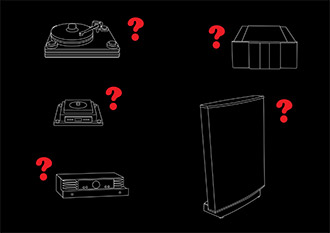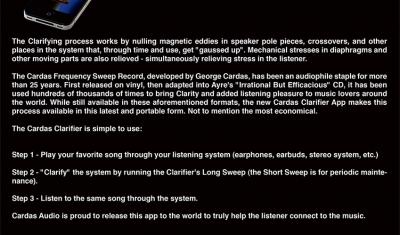CARDAS CLARIFIER
George Cardas's "Sweeper LP" has been a widely used tools for de-gaussing a phono cartridge and the rest of an audio system for many years. In order to move forward with developments of the modern era, Josh Meredith of Cardas Audio has written an excellent application called Clarifier. Instead of playing an LP record, we can use an application available for download from Apple's AppStore. The new Cardas Clarifier has been written for the screen size of an iPhone or iPod Touch, but can be installed and used on iPad, too. Clarifier is a tool that enables efficient de-gaussing of headphones or other components and systems your i-device may be connected to.
Cardas Clarifier is available from Apple AppStore, costs £0.69 and is wholeheartedly recommended.
AVALON ACOUSTICS & AUDIOFREAKS

At the beginning of July we were notified by Avalon Acoustics Inc. that, with immediate effect, our services as their UK distributor were no longer required. We wish Neil Patel and Avalon Acoustics all the very best in their future presence within the UK high-end audio scene, and will keep 14 years of our association with artisans from Boulder, Colorado in fond memory. Anyone aspiring towards a realistic and lifelike reproduction of music, rather than 'artificially perfect musical data retrieval' from their audio systems, will have to search hard to find a more suitable loudspeaker design approach for their musical pleasure and joy.
As a consequence of this development, we have a good selection of Avalon loudspeakers in physical stock, which we are clearing at an accommodating cost. Details can be found in our Summer 2012 Temptations list within this web site. We are, as ever, at your service by telephone or email in case you have questions or wish to discuss in more detail.
WHICH PART OF AN AUDIO SYSTEM MATTERS MOST?

It must be over 30 years since one of the most powerful audio ringmasters launched a new way of thinking generating an unimaginable long-term effect on the audiophile posterity. His name is Ivor Tiefenbrun and the infamous phrase "Garbage In, Garbage Out" instructed us to deem the source (components) of our music to be the most important element of every audio system. Not only, the instruction to "tap with our feet whenever we could truly feel the music we were listening to" made sure we all felt like proper “rhythm and pace” addicts no matter whether it was Iron Butterfly or Richard Wagner blasting through our loudspeakers. And that was it!
At the time, and for some years to follow, the new 'religion' seemed perfectly justified and acceptable. Turntables, arms and cartridges developed to unimaginable high levels of performance. Even the birth of CD in March 1983 could not pose a serious threat to a firmly established source for many years to come. As CD and associated playback hardware progressed and sounded better, the importance of the source component remained a valid thesis for many good reasons.
Without the slightest intention to criticise or reject the aforementioned approach (at least not in idealistic essence), let us consider a slightly different perspective, which, from our daily experience, gradually developed over the 15 years. Let us merely suggest that, rather than the source component of a quality audio system, it is the loudspeaker that, in actual reality, transpires as the most important and final sound quality determining element! It is somewhat ironic to say this just a few paragraphs after we told the world we no longer have a loudspeaker brand in our portfolio. However, this concept we would like you to give some thought to is far too important to be influenced by such a circumstance. Why? Because - loudspeakers are the only element of every audio system that ruthlessly deliver a seriously different (and very audible) end result if just one of very many parameters influencing its performance may change. Room acoustics, positioning, ambient temperature, ambient humidity, etc., etc. Because - the ultimate sonic result and performance of a loudspeaker will be critically determined by other components within an audio system to a far greater magnitude than the other way around. Because - in order to truthfully and realistically assess the overall sonic result of any audio system, we need a stable and consistent reference! And, perhaps, only the "greatest sonic variable" of an audio system, once chosen and implemented to the user's full satisfaction, can become a true reference! A reference around which, the rest of an audio system will be built to the best possible end result. Last, but not least - serious loudspeakers are anything but portable. Consequently, they are the most impractical components, equally so for the supplier and the client, to be presented and demonstrated within the client's own acoustic environment. One assumes that any seriously conceived audio system would exhibit a reasonable amount of versatility of its own singular virtues and, as any true audiophile or high-end grade creation, should allow other similarly successful components to shine all the way. If so, a well-chosen loudspeaker will bring a huge reward towards a superior end result. Otherwise, there is not really much point in having the best available source components (or else further down the signal path) with an inadequate loudspeaker at the end of the road. Simply put: the best source will hardly be able to tell you how good or bad your loudspeakers are. The best loudspeakers will be able to expose all the inadequacies of whatever is sent their way.
